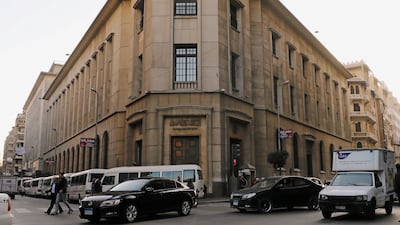Saudi Arabia has deposited $5 billion in the Central Bank of Egypt in recognition of the "deep-rooted relations between the two countries", the Saudi Press Agency reported on Wednesday.
The deposit comes after Egypt sought the support of the International Monetary Fund last week to help cushion the impact of the war in Ukraine on its economy.
Egypt, the most populous Arab country, is facing new economic headwinds after Russia's invasion of Ukraine, which has prompted foreign investors to flee emerging markets and disrupted the global supply chain.
Egypt’s central bank raised its key interest rates by 100 basis points at an exceptional monetary policy committee meeting last week. The Egyptian pound subsequently depreciated as much as 15 per cent after it had remained little changed since November 2020. The currency was trading at 18.24 pounds to the dollar on Wednesday.
The March 21 interest rate increase is the first by Egypt's central bank since 2017. Rising international commodity prices due to the Russia-Ukraine conflict and increased risk-off sentiment have added to external imbalances and were key factors behind the CBE move, Abu Dhabi Commercial Bank said in a research note.
"We see this devaluation as a positive reflection of the shift in external fundamental developments, reducing the overvaluation of the EGP and supporting capital inflows," ADCB said. "We now see scope for an additional 200-300 bps of rate increases by end-2022," the ADCB wrote.
In a note this week, Japan's largest lender MUFG Bank said the 100bp emergency rate hike as well as the currency devaluation are "a testament of the authorities in taking the necessary steps to align their policy framework with domestic and global realities".
"These moves are set to bring stability to the capital account on two grounds," it said.
"First, it will help confine remaining portfolio investments in the domestic market which may be unwilling to realise the Egyptian pound depreciation, reducing the prospect of further outflows. Second, it will assist in incentivising fresh inflows into the domestic market as investors perceive a reduced risk of further devaluations, and even the prospect of appreciation once there is more visibility on the global macro outlook.
Egypt unveiled an emergency $7.05bn relief programme last week to soften the blow on the most vulnerable Egyptians from rising food prices. About 30 per cent of Egypt’s 102 million population live below the poverty line.
The North African country is the world's largest wheat importer, with Russia and Ukraine accounting for 86 per cent of its $2.7bn wheat imports in 2020. Egypt has reached out to France and India to help it secure wheat supplies.
"The government has resorted to workarounds such as reducing the size of subsidised loaves and banning exports of key staples like flour, lentils and wheat for at least three months to stave off price hikes and shortages," Patrick Curran, a senior economist at Tellimer Research, said in a note last week.
"It will be aided in these efforts by a strong local harvest this year, which is expected to come in at 5mn tonnes versus previous estimates of 4mn. The risk of a balance of payments crisis has also been reduced by [the] currency devaluation and rate hike."
In October Saudi Arabia deposited $3bn in Egypt's central bank and extended the term of another $2.3bn in previous deposits. The new deposit on Wednesday increases the total amount to $10.3bn.
On Tuesday, Egypt and Qatar agreed to sign $5bn in investment agreements.
The backing from Gulf countries will help Egypt shore up its finances and potentially unlock further assistance from the IMF as part of a potential structural adjustment programme. Egypt secured IMF programmes in 2016 and 2020 providing $19bn of support to the country.


